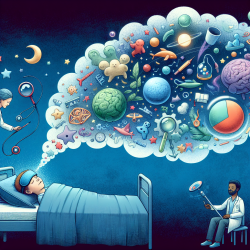Unlocking the Power of Sleep: Insights for Practitioners
In the world of child development and therapy, sleep plays a crucial role. The recent research article, The family business: turning sleep into dreams, offers valuable insights into the science of sleep and its implications for practitioners working with children. Authored by Drs. Anthony, Joyce, and Helen Kales, this study delves into the intricate relationship between sleep and various psychiatric disorders, providing a comprehensive understanding that can enhance therapeutic practices.
Key Takeaways from the Research
The research highlights several critical findings that can inform practitioners' approaches to therapy:
- Insomnia: Identified as the most prevalent sleep disorder, insomnia is linked to high levels of morbidity and distress. The study emphasizes the importance of addressing underlying psychopathology and emotional arousal to manage insomnia effectively.
- Parasomnias: Conditions like sleepwalking and night terrors occur during non-REM sleep, while nightmares arise from REM sleep. Understanding these distinctions can aid in accurate diagnosis and treatment.
- Disorders of Excessive Daytime Sleepiness: Narcolepsy and sleep apnea require careful evaluation, with specific attention to demographic factors and associated risks such as hypertension and obesity.
- Evaluation of Psychoactive Drugs: The research underscores the use of sleep laboratories to assess the efficacy and side effects of hypnotics, leading to improved prescribing practices.
Implementing Research Insights in Practice
For practitioners, integrating these findings into therapy can lead to more effective interventions. Here are some practical steps:
- Comprehensive Sleep Histories: Incorporate detailed sleep histories and psychological testing into assessments to identify potential sleep disorders and tailor interventions accordingly.
- Focus on Emotional and Physiological Arousal: Address emotional arousal, such as anxiety and rumination, to alleviate insomnia and improve sleep quality.
- Utilize Sleep Laboratories: Consider the use of sleep laboratories for evaluating the impact of psychoactive drugs, ensuring that treatment plans are based on robust evidence.
Encouraging Further Research
While the research provides a solid foundation, it also opens avenues for further exploration. Practitioners are encouraged to delve deeper into the connections between sleep and psychiatric disorders, contributing to a growing body of knowledge that can enhance therapeutic outcomes.
For those interested in exploring the full research paper, please follow this link: The family business: turning sleep into dreams.










